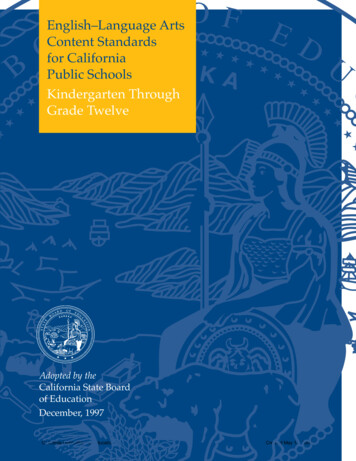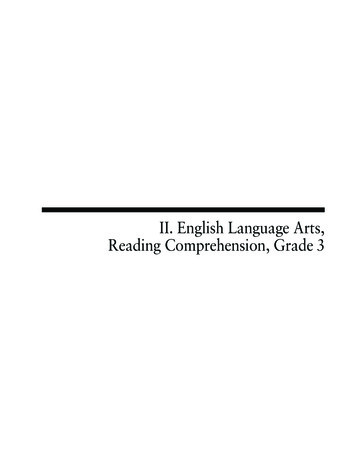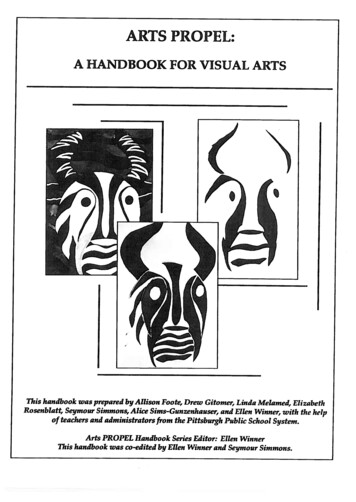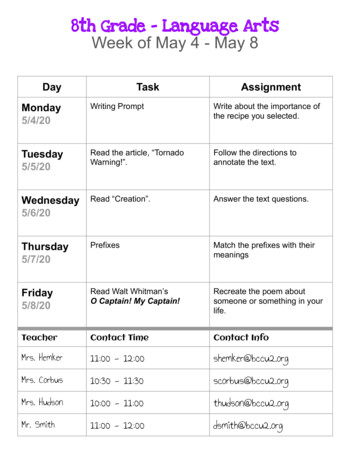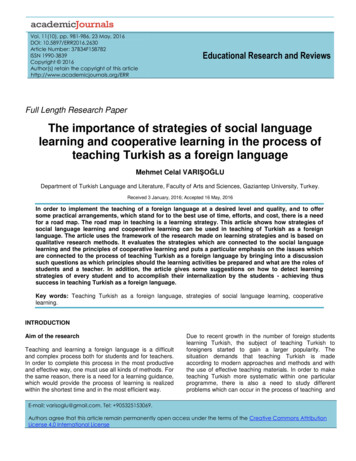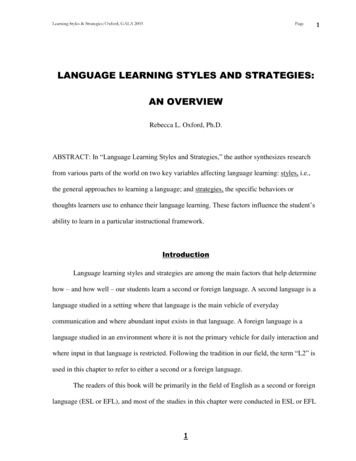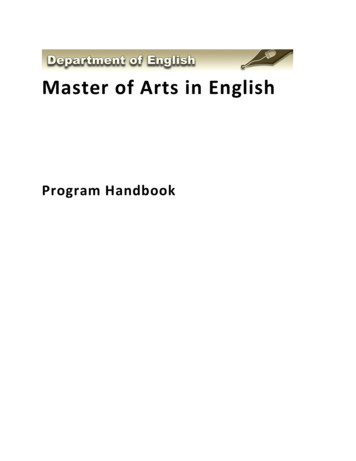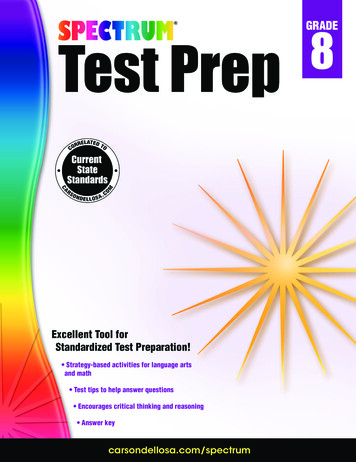
Transcription
NameDateEnglish Language ArtsCite Text Evidence to Support AnalysisReading: LiteratureDIRECTIONS: Read the story. Then, answer the questions that follow.From “The Red-Headed League” by Arthur Conan DoyleThe portly client puffed out his chest with an appearance of some little prideand pulled a dirty and wrinkled newspaper from the inside pocket of his greatcoat.As he glanced down the advertisement column, . . . I took a good look at the manand endeavoured, after the fashion of my companion, to read the indications whichmight be presented by his dress or appearance.I did not gain very much, however, by my inspection. Our visitor bore everymark of being an average commonplace British tradesman, obese, pompous, andslow. He wore rather baggy grey shepherd’s check trousers, a not over-clean blackfrock-coat, unbuttoned in the front, and a drab waistcoat with a heavy brassy Albertchain, and a square pierced bit of metal dangling down as an ornament. A frayedtop-hat and a faded brown overcoat with a wrinkled velvet collar lay upon a chairbeside him. Altogether, look as I would, there was nothing remarkable about theman save his blazing red head, and the expression of extreme chagrin anddiscontent upon his features.Sherlock Holmes’ quick eye took in my occupation, and he shook his head witha smile as he noticed my questioning glances. “Beyond the obvious facts that hehas at some time done manual labour, that he takes snuff, that he is a Freemason,that he has been in China, and that he has done a considerable amount of writinglately, I can deduce nothing else.”Mr. Jabez Wilson started up in his chair, with his forefinger upon the paper, buthis eyes upon my companion.“How, in the name of good-fortune, did you know all that, Mr. Holmes?” heasked. “How did you know, for example, that I did manual labour. It’s as true asgospel, for I began as a ship’s carpenter.”“Your hands, my dear sir. Your right hand is quite a size larger than your left.You have worked with it, and the muscles are more developed.”“Well, the snuff, then, and the Freemasonry?”“I won’t insult your intelligence by telling you how I read that, especially as,rather against the strict rules of your order, you use an arc-and-compass breastpin.”“Ah, of course, I forgot that. But the writing?”“What else can be indicated by that right cuff so very shiny for five inches, andthe left one with the smooth patch near the elbow where you rest it upon thedesk?”“Well, but China?”“The fish that you have tattooed immediately above your right wrist could onlyhave been done in China. . . . That trick of staining the fishes’ scales a delicate pinkis quite peculiar to China. When, in addition, I see a Chinese coin hanging from yourwatch-chain, the matter becomes even more simple.”Mr. Jabez Wilson laughed heavily. “Well, I never!” said he. “I thought at first thatyou had done something clever, but I see that there was nothing in it after all.”Spectrum Test Prep Grade 8CD-704690CI.indd 7English Language Arts711/11/14 12:03 PM
NameDateEnglish Language ArtsCite Text Evidence to Support AnalysisReading: LiteratureDIRECTIONS: Use the story to answer the questions.StrategyAs you read, use details from the story to make inferences and cite specificdetails that are strong enough to support your ideas.Test TipBe sure that the details you choose strongly support your ideas. Choose thedetails that best show why your ideas are valid.1. Part A: Why does the narrator, Dr. Watson, try tomake his own deductions about Mr. Wilson?AJabez Wilson is an exceptionally interestingperson.BWatson wants to see if he can make as manydeductions about Wilson as Holmes does.CHolmes relies on Watson’s first impressions todecide whether to take on a new client.DHolmes and Watson are suspicious of their newclient and are testing him to see if Wilson islying to them.The word peculiar usually means “odd” or “unusual.”However, it can have other meanings. Whichmeaning best fits the way the word peculiar is usedin this excerpt?A commonBfamiliarCtraditionalDuniqueWrite how you know.Part B: Write the sentence from the story thatsupports your answer to Part A.3. After Holmes explains his method, Jabez Wilsonsays “there was nothing in it after all.” Do youagree that there is nothing remarkable aboutSherlock Holmes’ deductive ability? Cite at leasttwo pieces of evidence from the story to supportyour opinion.Test TipSubstitute the word you chose from question2 into the original sentence to see if it has theright meaning.2. Read the following excerpt from the passage:“The fish that you have tattooed immediately aboveyour right wrist could only have been done in China. . . That trick of staining the fishes’ scales a delicatepink is quite peculiar to China.”English Language Arts 8CD-704690CI.indd 84. Write the sentence from the story that would bestsupport the inference that the narrator does notthink the man visiting Sherlock Holmes is specialor interesting.Spectrum Test Prep Grade 811/11/14 12:03 PM
NameDateEnglish Language ArtsDetermine Theme and SummarizeReading: LiteratureDIRECTIONS: Read the story. Then, answer the questions that follow.The Zen FarmerOnce upon a time, there was an old Chinese farmer who had only one horse.One day, the mare broke through the fence and ran away. Upon hearing the news,his neighbors came to console the old man. “Now you have no horse to help youplant your crops. Such bad luck,” they said sympathetically.“Maybe good, maybe bad,” the farmer replied.The next morning the horse returned, bringing with her two wild stallions.“Now you are rich—you have three horses. What good luck!” the neighborsexclaimed.“Maybe good, maybe bad,” replied the old man.The following day, his son tried to ride one of the untamed horses. The stallionthrew him and the youth broke his leg. The neighbors again came to console thefarmer. “Now you have no one to help you plant your crops,” they commiserated.“We are sorry for your bad luck.”“Maybe good, maybe bad,” answered the farmer.The next day, officers of the emperor’s army came to the village and draftedevery able-bodied young man. Seeing that the old man’s son had a broken leg, theypassed him by. The neighbors, weeping for the sons who had been taken fromthem, congratulated the farmer. “At least your son had the good luck to avoid thedraft,” they said.“Maybe good, maybe bad,” said the old farmer.StrategyEvaluate each detail to make sure it is strong enough to support your theme.If the detail is weak, look for another detail.Test TipThis passage is a Zen teaching story. The theme is a lesson. The lesson istaught by the way the old farmer reacts to what happens.1. Which sentence best summarizes the story?AA mare escapes from his fence and runsaway, returning the next day.BA man’s neighbors wish bad luck on an oldChinese man who is negative and mean.CAn old Chinese farmer accepts the good andbad events that happen to him and his family.DA son is not asked to serve in the armybecause he has a badly broken leg.Spectrum Test Prep Grade 8CD-704690CI.indd 9Write how you know.2. What is the main difference between the oldfarmer and his neighbors?English Language Arts911/11/14 12:03 PM
NameDateEnglish Language ArtsDetermine Theme and SummarizeReading: LiteratureDIRECTIONS: Read the story. Then, answer the questions using details from the story.StrategyWhen you determine a theme, find at least two details in the story that supportsit. If you can’t find any details, look for a new theme.Test TipRemember that the theme is the overall message or lesson in a story. It is notthe topic, or what the story is about. It is also not the plot, or what happens inthe story.3. If the story continued, what would you expect tohappen next?Aan event that seems to be bad luckBan event that seems to be good luckCanother visit from the army officersDa shift from the farmer’s point of view tohis son’s5. State the main lesson, or theme, of the story inyour own words.Write how you know.Write two details from the story that supports thetheme you wrote above.4. What detail tells you the story is set in China?AWild horses live near the village.BFarmers do not use tractors to plant crops.CYoung men are drafted into the emperor’sarmy.DSomeone with three horses is consideredwealthy.English Language Arts 10CD-704690CI.indd 10Spectrum Test Prep Grade 811/11/14 12:03 PM
NameDateEnglish Language ArtsInterpret Figurative and Connotative LanguageReading: LiteratureDIRECTIONS: Read the poem. Then, answer the questions that follow.O Captain! My Captain! by Walt WhitmanO Captain! my Captain! our fearful trip is done,The ship has weather’d every rack, the prize we sought is won,The port is near, the bells I hear, the people all exulting,While follow eyes the steady keel, the vessel grim and daring;But O heart! heart! heart!O the bleeding drops of red,Where on the deck my Captain lies,Fallen cold and dead.O Captain! my Captain! rise up and hear the bells;Rise up—for you the flag is flung—for you the bugle trills,For you bouquets and ribbon’d wreaths—for you the shores a-crowding,For you they call, the swaying mass, their eager faces turning;Here Captain! dear father!The arm beneath your head!It is some dream that on the deck,You’ve fallen cold and dead.My Captain does not answer, his lips are pale and still,My father does not feel my arm, he has no pulse nor will,The ship is anchor’d safe and sound, its voyage closed and done,From fearful trip the victor ship comes in with object won;Exult O shores, and ring O bells!But I with mournful tread,Walk the deck my Captain lies,Fallen cold and dead.StrategyTo gain a deeper understanding of poetry, reread a poem and identify thenonliteral meanings of figurative language. Then, determine the connotativemeaning of words and phrases.Test TipHistorical events may be part of a poem or story’s theme. This poem waswritten to mark the death of Abraham Lincoln, shortly after the Civil War ended.As you read, connect words in the poem to what you know about Lincoln.1. The author uses the word exulting to describethe people waiting for the ship to arrive. Use thecontext to choose the phrase that best explainsthe connotative meaning of exulting.Anegative: amazed surpriseBpositive: nervous excitementCnegative: deep sorrow and griefDpositive: great happiness and joyWould the word cheering have the samemeaning? Write how you know.Spectrum Test Prep Grade 8CD-704690CI.indd 11English Language Arts1111/11/14 12:03 PM
NameDateEnglish Language ArtsInterpret Figurative and Connotative LanguageReading: LiteratureDIRECTIONS: Use the poem to answer the questions.StrategyUse context clues to determine the meaning of figurative language as well as thepoem’s theme or main message.Test TipKeep examples of figurative language in mind as you read. Similes use acomparison word, such as like or as. Use these words as clues to identify andinterpret similes. Metaphors just compare two unlike things without any word clues.2. If Lincoln is the Captain, what is the ship?Athe NorthBthe SouthCthe United StatesDthe White HouseWhat type of figurative language is used? Writehow you know.3. Which phrase from the poem means almost thesame thing as the word object in the followingline from the poem?4. How would replacing the word mournful with theword saddened in the lines below affect themeaning of the poem?Exult O shores, and ring O bells!But I with mournful tread,Walk the deck my Captain lies,Fallen cold and dead.5. The metaphor comparing a country to theShip of State goes back to the Greekphilosopher Plato. Identify an example ofhow Whitman alludes to the Ship of Statein this poem.“From fearful trip the victor ship comes in withobject won”A“our fearful trip is done”B“the prize we sought is won”C“Rise up—for you the flag is flung”D“its voyage closed and done”Write how you know.English Language Arts 12CD-704690CI.indd 126. Whitman uses the phrase “dear father” in thepoem. Whitman is comparing Lincoln’s presidencyto being a parent. The citizens of the UnitedStates are children, and Lincoln is the father. Howare Lincoln and the captain of a ship fathers?Spectrum Test Prep Grade 811/11/14 12:03 PM
NameDateEnglish Language ArtsAnalyze CharactersReading: LiteratureDIRECTIONS: Read the story. Then, answer the questions that follow.Thinking resentfully about the history report that was due tomorrow, Jana heardher teacher’s voice replay inside her head: “Don’t just copy something fromWikipedia; write about something that made a difference.”She wanted to stomp up the steps and slam her front door, but instead shestopped to wave to her neighbor, who was moving a covered box to her car. Thewind blew the lid off the container, and photos and newspaper clippings, caught inthe gust, were soon swirling everywhere. Jana ran after them, collected them, andbrought them back to Ms. Colvin.“Thank you, dear,” said her neighbor. “I had these all sorted to donate to thehistorical society, and I would hate for some of this history to go missing.”As Jana handed her a newspaper from 1955, she noticed a teenager wholooked a lot like her neighbor pictured on the front page under the headline “GirlHeld Guilty of Refusing to Move to Back of Bus.”“Is that you, Ms. Colvin?” asked Jana, pointing to the picture.“Why, yes, dear, it is,” her neighbor replied. “I was 15 at the time. I was sitting inthe segregated section of the bus when the driver asked me to move so a whitewoman wouldn’t have to sit close to me. We had been studying about black history,and I knew I wasn’t breaking a law. So I stayed put.”“How did you have the courage to stay in your seat?” asked Jana.“Actually, I couldn’t have moved,” said her neighbor. “It felt like SojournerTruth’s hands were pushing me down on one shoulder and Harriet Tubman’s handswere pushing me down on another shoulder.”“So you knew even then that you were doing something that would make adifference,” said Jana.“Oh, yes,” replied her neighbor. “And if I didn’t then, I certainly knew when RosaParks did
O Captain! My Captain! by Walt Whitman O Captain! my Captain! our fearful trip is done, The ship has weather’d every rack, the prize we sought is won, The port is near, the bells I hear, the people all exulting, While follow eyes the steady keel, the vessel grim and daring; But O heart! heart! heart! O

